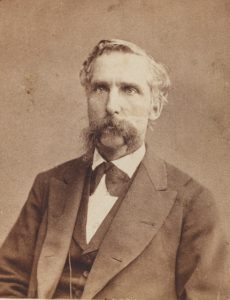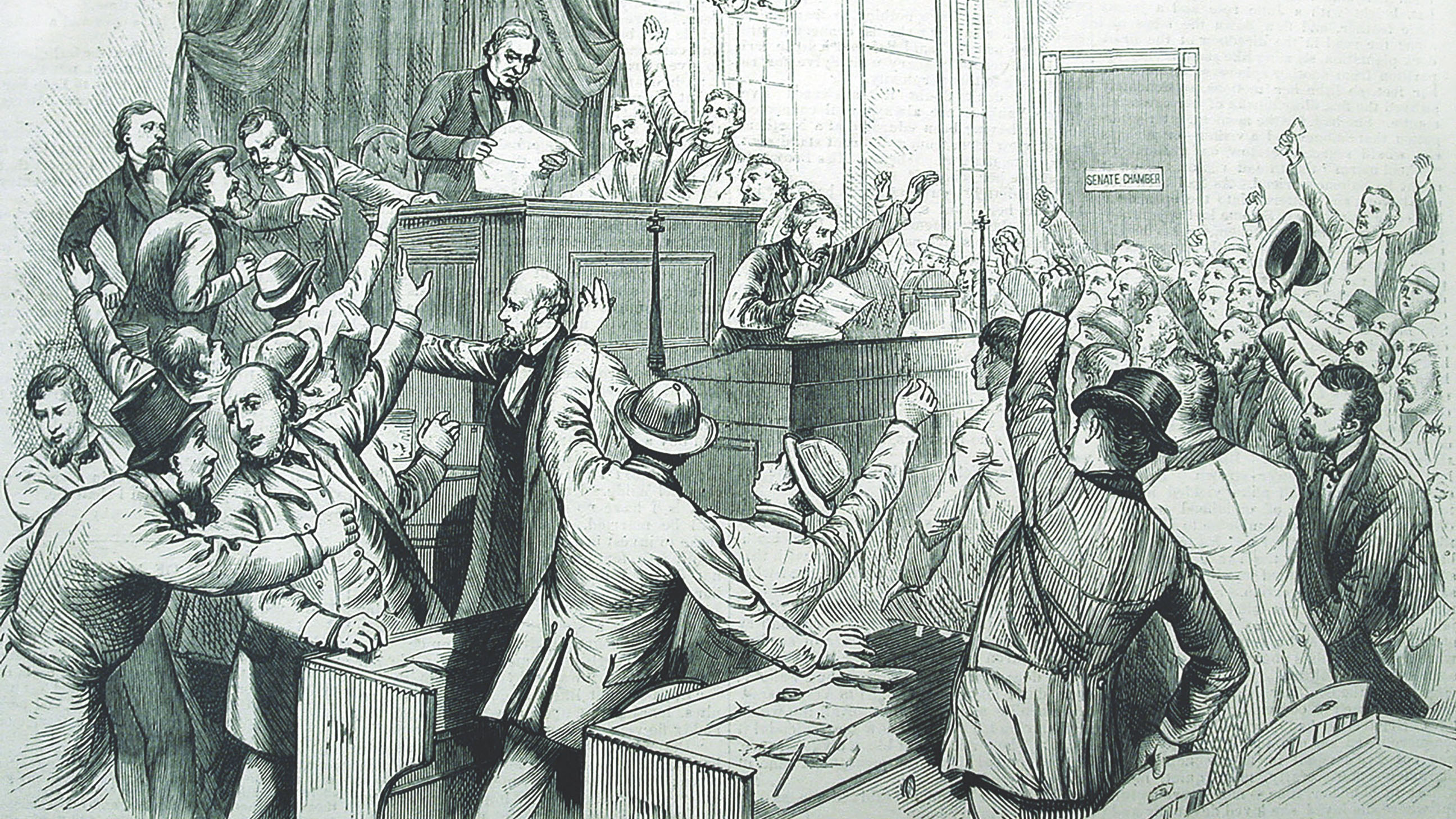With Maine torn apart by political violence in 1880, war hero Joshua Chamberlain again answered the call
In July 1863, Colonel Joshua Lawrence Chamberlain became a household name for his leadership during the 20th Maine’s sweeping charge down Little Round Top, a critical turning point in the Army of the Potomac’s victory at Gettysburg. A little more than a quarter-century later, when a disputed gubernatorial election threw his home state of Maine into turmoil in early 1880, Chamberlain stared down danger once more. Now 51, the war hero and former governor was called to preside in the state capital of Augusta until the situation could be resolved. Despite Chamberlain’s steady hand and trademark calm, tensions mounted. For the 12 days he wore his old Army uniform, Fusionists (the name given to Democrats and Greenbackers who voted together) and Republicans alike curried his favor—and when such smooching failed, some even plotted to kill him.
The crisis began with the gubernatorial election of September 8, 1879, featuring four candidates: Democrat (and current governor) Alonzo Garcelon; Republican Daniel F. Davis; Greenbacker Joseph L. Smith; and perennial election loser Bion Bradbury. Although Davis received the most votes, he didn’t have a needed majority to clinch the win, leaving the decision to the incoming legislature, to be seated in January 1880. The election gave the Republicans legislative control and, thus, the right to select a Republican governor, but after Garcelon and members of his hand-picked Executive Council meticulously reviewed the results, the governor declared that 37 apparently victorious Republican candidates (eight senators and 29 representatives) had lost and 25 losing Fusionist candidates (eight senators and 17 representatives) had won—revisionism that gave the Fusionists legislative control.
Garcelon and his minions cited specific examples of alleged wrongdoing, including forged signatures and questionable spelling of names. Maine exploded politically. Voters packed public halls and protested in thundering diatribes and petitions. Among the outraged were voters from the small town of Winthrop, who fumed in a detailed resolution sent to Augusta that Garcelon had overthrown “the plainly declared will of the people.”
Garcelon’s opponents hoped the Maine Supreme Judicial Court would review the disputed election results. The court did so in late 1879 and ruled that sloppy handwriting and misspelled names, “if understood,” did not disqualify disputed votes. They had to be counted.
As one newspaper growled, “The Prevailing Feeling [is] One of Resistance.” Armed men proceeded to Augusta, and when Garcelon garrisoned the State House with a “military force” at night, a Republican editor labeled the building “Fort Garcelon.”
The Fusionist-led legislature convened in early January. When asked by five Republican legislators to remove “the armed force” and its “paraphernalia” from the State House, Garcelon replied he would consider it.
With his term expiring at midnight, January 9, Garcelon knew that his departure would leave a rudderless government. On January 5, he announced in Special Orders No. 45, that Chamberlain was “authorized and directed to protect the public property and institutions of the State until my successor is duly qualified.” Garcelon’s adjutant general, S.D. Leavitt, promptly organized Maine’s “several counties…into the first militia division,” with Chamberlain in command.
A Portland newspaper stated the obvious: “Gen. Chamberlain is now the only lawful State authority…until a Governor is chosen and qualified.” The war hero was “the sole possessor of executive power….He will see that the peace is kept and that law and order prevail.”
In early January, Republican legislators posed 27 questions to the state’s supreme court—convening now in Bangor, 75 miles away by train from Augusta—and, along with Chamberlain and countless other Mainers, awaited the justices’ official decision.
As Chamberlain reached the capital and settled into an obscure State House office, a newspaper reported that “all his movements are carefully observed.” By January 9, he had arranged with Augusta police to place officers in the State House and to arrest “all parties…breaking the peace.”

Discovering “unauthorized persons” in the Executive Council chamber, Chamberlain ordered them out, locked the door, and pocketed the key. Thronged by “citizens…asking and urging all manner of things,” he set a police guard outside his office door.
Chamberlain summoned to Augusta a few trusted friends—all veteran officers as well—and made them aides. He then sent packing “the bummer guard” allegedly protecting the State House. Wiring militia officers not to organize their units unless directed by him, he worked with Augusta Mayor Charles A. Nash to keep sufficient city police on hand.
Because Chamberlain had served four terms as a Republican governor, Grand Old Party interests in the state were convinced they owned him. The Fusionists, on the other hand, tried to intimidate Chamberlain, figuring he was just one man. Both parties underestimated him.
Wanting the crisis resolved in Republican favor, U.S. Senator James Blaine of Maine even dangled a juicy political bribe. He would resign his seat in Washington, D.C., and back Chamberlain as his replacement if the general supported the Republicans. The bribe failed.
Violent threats circulated. The Bangor Commercial, for one, delivered a “bitter attack…calling me a traitor, & calling on the people to send me speedily to a traitor’s doom”—execution, in other words, Chamberlain informed his wife, Fanny.
The rebellion peaked January 14. Chamberlain would call it “another Round Top, although few knew of it.”
“There were threats all morning of overpowering the police & throwing me out of the window,” he reported to Fanny, “& the ugly looking crowd seemed like men who could be brought to do it (or to try it).”
When, he noted, angry partisans threatened “fire & blood” or cajoled him “to call out the militia at once…I stood it firmly through, feeling sure of my arrangements & of my command of the situation.”
That afternoon he learned that subversives planned “to arrest me for treason” and toss him “in prison while they inaugurated a reign of terror & blood.” Perhaps Chamberlain saw through the smokescreen and called their bluff, because “they foamed & fumed…all that evening,” but “that plan failed.” Later that night, he was informed of another threat in which he “was to be kidnapped—overpowered & carried away & detained” in parts unknown, “so that the rebels could carry on their work.”
Wartime memories were sparked. “I had the strange sense again—of sleeping inside a picket line,” he wrote.
Later that night (perhaps early Friday), two Maine Civil War heroes brought reinforcements to Augusta. From Bath came Thomas Hyde (7th Maine Infantry) “with 30 men.” From Waterville came Francis Heath (19th Maine Infantry) “with 50 men: sent for by Republicans[,] I suppose,” Chamberlain observed. “Greatly annoying to me & embarrassing[,] too.”
Chamberlain demurred when Blaine advised “ordering out the Militia.” Citing “the storm…raging around me here in the State House” and “the wicked men inside this building as well as outside,” he assured the senator that “the dispositions I have made” mean “the position shall be held,” and also pledged, “Neither force [nor] treachery nor trick” would overwhelm the State House defenders.
Apparently Chamberlain had quietly established an intelligence system that operated with the help of loyal Mainers and the telegraph. “I have means of knowing all that is going on all over the State, & shall be ahead if force is resorted to,” he informed the senator.
In a lengthy January 16 ruling in Bangor, sent to Augusta the next day, the justices rebuffed Garcelon and the Fusionists by stressing that “the Governor and Council” had no constitutional right to seat a legislative candidate who “was not voted for” or “was defeated” in an election.
Individuals seated this way “would be intruders without right into a legislative body,” the justices wrote. Candidates “rightfully elected as shown by the official returns” must be seated. Then, referring to specific municipalities, the court tossed out losing Fusionist candidates who had been appointed to the legislature and installed winning Republican candidates who were denied their seats.
The unanimous decision restored the actual election results and kept the legislature Republican-controlled. Davis would replace Garcelon as governor.
In their January 17 editions, Maine dailies either applauded or booed the decision. All ink protests to the contrary, “the bogus Fusion Legislature” adjourned Saturday morning and, in “the second act of the drama…being played in the State House,” legally elected legislators took their seats at 2 p.m.
“Crowds of people” jammed the building, the House galleries, and the House floor; “the rotunda…was a perfect jam,” but “the best of order prevailed inside and outside the building,” a newspaper commented.
Spectators wildly cheered the new governor Davis (known as “the Little Corporal” because of his height and the rank he once held in the 1st Maine Cavalry) as well as Blaine, Chamberlain, Nash, and others who had been involved in seeing justice done.
After taking his oath of office and delivering a short message, Davis “repaired to the [Executive] Council Chamber.” He almost did not get in. Chamberlain discovered that a final act of Fusion skulduggery had left the council’s chamber door locked and its keys missing. With Nash’s help, that problem was soon rectified.
Accessed from the chamber, the governor’s office “was still locked and no key to it could be found,” a reporter wrote. Nash summoned a locksmith who picked the lock and found a key inserted into it from inside the office.
Now in possession of keys to both rooms, Chamberlain ordered the doors locked while he eyed the legislative proceedings. Sworn in, Davis finished his speech and, along with his chosen Executive Council members, headed for the council’s chamber.
Chamberlain ordered the doors unlocked, and Maine’s election crisis peacefully ended. He followed with a letter to Davis conveying that with “the legality of your election…I consider my trust, under Special Orders No. 45, as at an end.”
In his General Orders No. 4, addressed to Maine’s militia officers, Chamberlain underscored that Davis was now the state’s “Commander-in-Chief.” He in turn thanked his aides, two particular militia officers, and Mayor Nash for the key roles they played in averting bloodshed at the State House. In closing, Chamberlain wrote, “The General also thanks the citizens of Maine for patiently enduring the political crisis to its peaceful conclusion.” With that, he returned home to Brunswick and Fanny.
Brian Swartz, who writes from Hampden, Maine, is author of the blog “Maine at War.” This post, which has been adapted for print, originally appeared on the “Emerging Civil War” blog (emergingcivilwar.com) on March 2–3, 2021.





